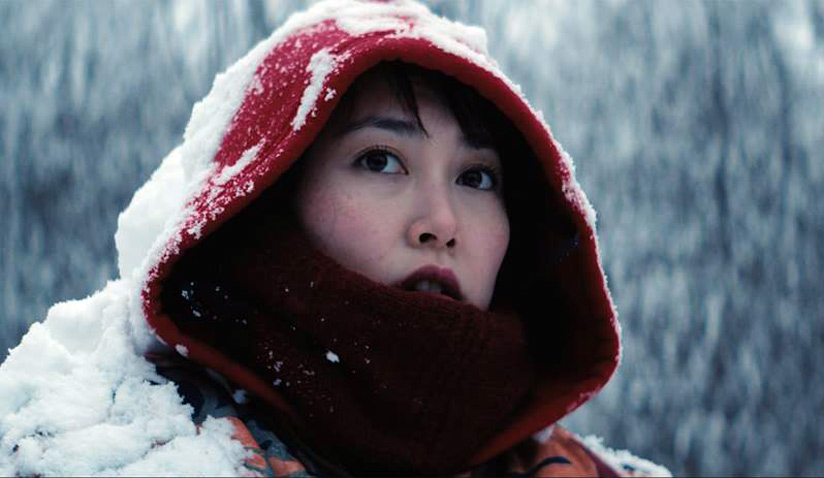 Living in a cramped Tokyo apartment while holding down an unfulfilling job, the lonely, disenchanted Kumiko yearns for something deeper. Much of her alienation stems from the weight of expectations of others. An “OL” (office lady) for a Japanese businessman, Kumiko goes through the motions of her job, fetching tea and dropping off and picking up laundry. Quieter and odder than everyone else, Kumiko stands out. Her fussy mother thinks it’s strange that a 29-year-old woman does not have a fiancé, husband or children, and notes most OLs have gone on to other careers upon reaching the age of 30. Does she have bigger plans? Is she thinking about her future? For Kumiko, these are difficult questions not only to answer but to address for herself.
Living in a cramped Tokyo apartment while holding down an unfulfilling job, the lonely, disenchanted Kumiko yearns for something deeper. Much of her alienation stems from the weight of expectations of others. An “OL” (office lady) for a Japanese businessman, Kumiko goes through the motions of her job, fetching tea and dropping off and picking up laundry. Quieter and odder than everyone else, Kumiko stands out. Her fussy mother thinks it’s strange that a 29-year-old woman does not have a fiancé, husband or children, and notes most OLs have gone on to other careers upon reaching the age of 30. Does she have bigger plans? Is she thinking about her future? For Kumiko, these are difficult questions not only to answer but to address for herself.
She is also hounded by her mother’s expectations. Where has she been? What is she doing? Has she found a man yet, and if not, what’s taking so long? These interrogations only have the effect of making Kumiko further retreat into her own dimly lit apartment where her one companion is her cute, furry bunny Bunzo. One day while going for a walk on the shore, Kumiko enters a little cavern by the beach and after digging through loose mud, discovers a soggy VHS tape. When she puts it in a VCR and presses play, she discovers images of a bloodied man on the lam and hiding a briefcase full of money by a wintry landscape in North Dakota.
 Kumiko is watching Steve Buscemi in “Fargo.” Entranced by the hazy, broken images of the VHS tape, she believes the video imagery is a divine message that she must heed. She promptly steals an American atlas from a library, and when she’s given access to the company’s business credit card, she puts her wordless plan into action. Kumiko reluctantly lets go of Bunzo on an abandoned subway car, and before she can articulate her intentions, she takes a plane to Minnesota: Kumiko has essentially absconded to retrieve the treasure buried in the snow in Fargo, North Dakota.
Kumiko is watching Steve Buscemi in “Fargo.” Entranced by the hazy, broken images of the VHS tape, she believes the video imagery is a divine message that she must heed. She promptly steals an American atlas from a library, and when she’s given access to the company’s business credit card, she puts her wordless plan into action. Kumiko reluctantly lets go of Bunzo on an abandoned subway car, and before she can articulate her intentions, she takes a plane to Minnesota: Kumiko has essentially absconded to retrieve the treasure buried in the snow in Fargo, North Dakota.
It’s easy to see why one of the film’s executive producers Alexander Payne would respond to this offbeat roadtrip picture, which is replete with deadpan humor and a forlorn protagonist (truthfully, we’d take this over “Nebraska” any day of the week). Written by award-winning short filmmakers David and Nathan Zellner (David takes the solo directing credit), “Kumiko The Treasure Hunter’ is a strikingly bizarre and beautiful film, and not to mention an utter delight.
A strange, sad portrait of a lonely dreamer on a quest, it also functions as two films in one: the funny but oppressive first half set in Japan, and the second set in a wintry American wonderland that’s whimsical for its seeming atmospheric solemnity. An evocative, ghostly score by the Octopus Project brilliantly blurs the line between music and sound design; and visually it’s strikingly beautiful, especially in the Minnesota-set section. David Zellner meets the challenge of shooting essentially two different films with two different crews and aesthetics with flying colors.

Moody, melancholic & cinematic, ‘Kumiko’ is anchored by a terrific, mostly silent performance by Rinko Kikuchi. Unique and distinctively written, Kumiko meets her share of characters during her pilgrimage to Fargo (including Nobuyuki Katsube, the Zellner brothers themselves and Shirley Venard), but thankfully she meets people rather than “characters.”
To that end, “Kumiko The Treasure Hunter” is a peculiar fairy tale. While Kumiko is wearing a Red Riding Hood-esque hoodie, the connection to that venerable fable isn’t overt, and only when her voyage leads her into the snowy dreamscape of the second half do the more fantastical elements of the film drift toward nightmare; the film’s point of view becomes mysteriously ambiguous when she enters a dark, frigid forest in search of her treasure. Both funny and lugubrious with respect for its characters’ instability, ‘Kumiko’ suggests a darkness more evocative for never being spelled out. Is Kumiko really just mentally ill? Having watched the DVD, we know she realizes that “Fargo” is fiction, but she still chooses to believe the movie is real. Is it a delusional sickness, is it determination, is it compartmentalization, or, most beguilingly, is Kumiko someone special who knows something we don’t? The Zellner brothers magical ‘Treasure Hunter’ leaves much to chew on its poignant final act, and much of this frosty and bracing expressionism will be a subjective experience. But either way, its ambiguity should dazzle and delight; even in its darkest reading, Kumiko goes into the night softly. [B+]
This is a reprint of our review from the 2014 Sundance Film Festival.

